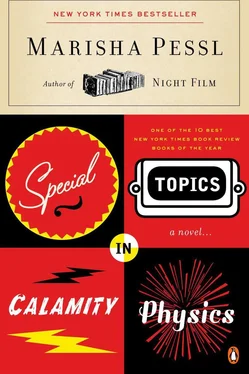I nodded.
He leaned down, hitching his elbows on the counter.
“Cuza him I kin play King Layer.”
“What flavor?” yelled Diamanta by the Slurpee machine.
“What flavor?” asked Larson. Without blinking, he recounted the names like an auctioneer overseeing a livestock sale. “Rootbeer, Blue Bubbagum, 7-Up, 7-Up Tropi cale, Grapermelon, Crystallat, ’Nana Split, Code Red, Live-War—”
“Rootbeer is fine. Thanks.”
“Lady without shoes would like Rootbeer,” he said into the intercom.
“King what did you say?” I asked.
He grinned, revealing two severely crooked front teeth, one peeking out from behind the other as if it had stage fright.
“Layer. Shakespeare personage. Contrary to popular belief, person needs heartbreak an’ betrayal. Else you got no stayin’ power. Can’t play a lead for five whole acts. Can’t play two performances inna day. Can’t fashion a character arch from Point A ta Point G. Can’t get through the denewment, create a convincin’ through line — all that stuff. See whut I’m sayin’? Person’s gotta get banged up. Gotta get jerked around, lived in. So he’s got somethin’ to use, see. Hurts like hell. Sure. Feels bad. Not sure you wanna go on. But that gives way to what they commonly call emotive re- zone -ance. An emotive rezonance makes it impossible fer people to take their eyes offa you, when yer onstage. Ever turned round in a good movie and seen the faces? Pretty intense. Diamanta?”
“Ain’t coming out right,” she cried.
“Turn off the machine, put it back on and try again.”
“Where’s the switch at?”
“On the side. Red.”
“Looks all nasty,” she said.
I stared up at him. Dad was right. There was something riveting about the kid. It was his outdated earnestness, the way his eyebrows did the polka when he talked and his mountain accent, which made the words jut out like pointy, slippery rocks on which he might get hurt. It was also the thousands of copper freckles dusting him head to toe as if he’d been dipped in glue, then in fine, penny-iridescent confetti.
“See,” he said, leaning in and widening his eyes, “ya ain’t felt pain, you kin only play yerself. And that ain’t gonna move people. Maybe yer good for toothpaste, hemorrhoid commercials and such. But that’s it. You’ll never be a legend in yer own time. Ain’t that what ya wanna be?”
Diamanta shoved the gigantic Slurpee into my hands and resumed her droop by the greeting cards.
“Now,” Larson said, slapping his hands together, “ya got to tell us what yer name is.”
“Blue.”
“Got to tell us. Blue. Came to my doorstep tonight in yer hour a’ need. Whud we do now?”
I looked from Larson to Diamanta, back to Larson again.
“What do you mean?” I asked.
He shrugged. “Ya turned up here ona dark stormy night. At”—he glanced at his watch—“2:06.” He peered at my feet and nodded. “No shoes. Swut they call dramatic action. Swut happens in the beginnin’ of a scene.”
He stared at me, his face grave as any photo of Sun Yat-sen.
“Gotta tell us if we’re in a comedy or a mellow drama or a whodidit or what they call a theater of the absurd. Ya just can’t leave us standin’ on stage with no dialogue.”
I was aware of a certain convenience-store calm coursing through me, steady and ho-hum as the thrum of the beer fridge. Where I wanted to go, whom I had to talk to, was plain as the mirrored windows, the display of gum and batteries, Diamanta’s hoop earrings.
“It’s a whodunit,” I said. “I was wondering if I could borrow your car.”
Hannah was wearing a housedress the color of sandpaper, crudely scissored off at the hem so tiny threads hula-danced around her shins when she opened the door. Her face was bare as an unpainted wall, but it was obvious she hadn’t been sleeping. Her hair hung serenely by her cheekbones and her bright black eyes bumblebeed from my face to my dress to Larson’s truck to my face — all in a matter of seconds.
“Goodness,” she said in a hoarse voice. “Blue.”
“I’m sorry I woke you,” I said. It was the sort of thing you said when you arrived on someone’s doorstep at 2:45 A.M.
“No, no — I was awake.” She smiled, but it wasn’t a real smile, more of a cardboard cutout, and instantly I wondered if I’d made a mistake in coming, but then she put her arm around me. “God, come on in. It’s freezing.”
I’d only ever been in her house with Jade and the others, with Louis Armstrong warbling like toads, the air full of carrots, and it felt claustrophobic now, forsaken and dim like the cockpit of an old crashed plane. The dogs peered at me from behind her bare legs, their gaunt army of shadows slowly advancing toward my feet. There was a light on, the goosenecked lamp in the living room, and it spotlighted papers on the desk, bills, a few magazines.
“Why don’t I fix you some tea?” she asked.
I nodded and after squeezing me again on the shoulder, she disappeared into the kitchen. I sat down on the lumpy plaid armchair next to the stereo. One of the dogs, Brody with three legs and the face of a senile sea captain woof ed in disgust, then hobbled over to me, pressing his cold wet nose into my hand, smuggling a secret. Pots coughed behind the kitchen door, a tap whimpered, a few moans from a drawer — I tried to concentrate on these mundane sounds, because frankly, I wasn’t feeling all that marvelous about being there. When she’d opened the door, I’d expected a terrycloth bathrobe, her hair a hornet’s nest, a heavy-eyed, “Sweet Jesus, what’s happened?” Or, hearing the doorbell, she should have taken me for a mulleted highwayman thirsty for gruel and a warm lady, or a livid ex-boyfriend with tattoos on his knuckles (“V-A-L-ER-IO,” it spelled).
I had not foreseen the stiff, clapboard manner with which she’d greeted me, the bare bones welcome, the whisper of a frown — as if I’d been wired for sound all night and she’d been privy to every defamatory chat, banter and tête-à-tête, including the one in which Jade accused her of Mansonian ties, and the one from my head, when the reality of Cottonwood smashed into the reality of Zach Soderberg and I was temporarily manslaughtered. I’d driven to her house (40 mph, barely able to merge, out of my mind when passing a semi or what resembled a wall of tulip poplars) because I loathed Dad, and could think of no other decent place to go, but I also sort of hoped seeing Hannah would lay to rest those other conversations, render them funny and invalid, the way a single scientific sighting of a Mysterious Starling (Aplonis marvornata) could tear it right off the Extinct Species list, throw it up on the dire, but decidedly more encouraging Critically Endangered.
Seeing her, however, had made it worse.
Dad always warned that it was misleading when one imagined people, when one saw them in the Mind’s Eye, because one never remembered them as they really were, with as many inconsistencies as there were hairs on a human head (100,000 to 200,000). Instead, the mind used a lazy shorthand, smoothed the person over into their most dominating characteristic — their pessimism or insecurity (sometimes really being lazy, turning them into either Nice or Mean) — and one made the mistake of judging them from this basis alone and risked, on a subsequent encounter, being dangerously surprised.
A gasp of the kitchen door, and she reappeared, carrying a tray piled with a sagging piece of apple pie, a wine bottle, a glass, a pot of tea.
“Let’s turn on some lights,” she said, pushing with her bare foot a National Geographic , a TV Guide and some mail off the coffee table before sliding the tray across it. She switched on the yellow lamp by an ashtray, cruddy with dead-worm cigarette butts, and thick light splashed all over me and the furniture.
Читать дальше












